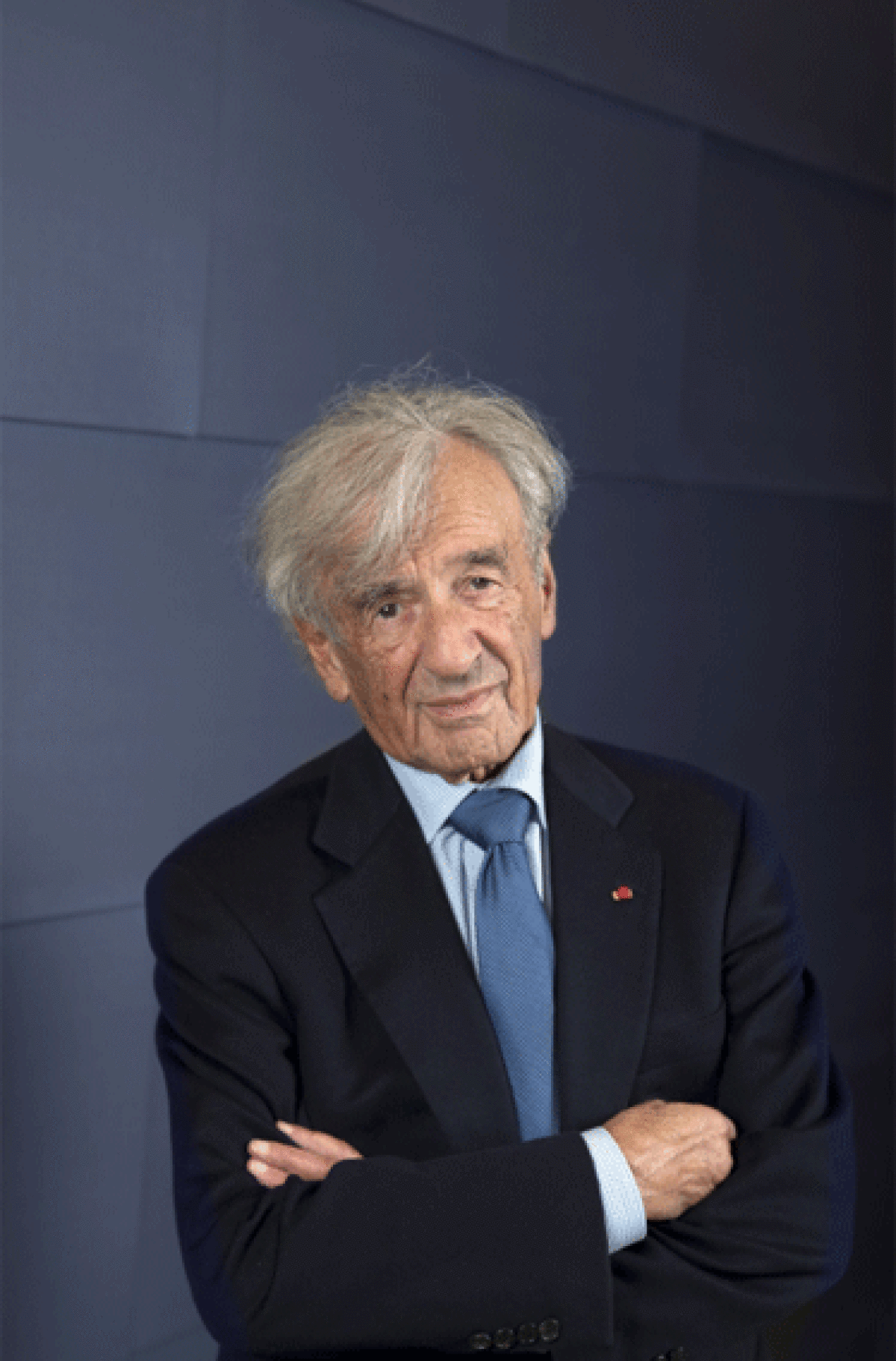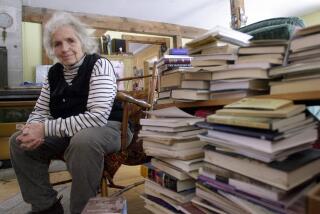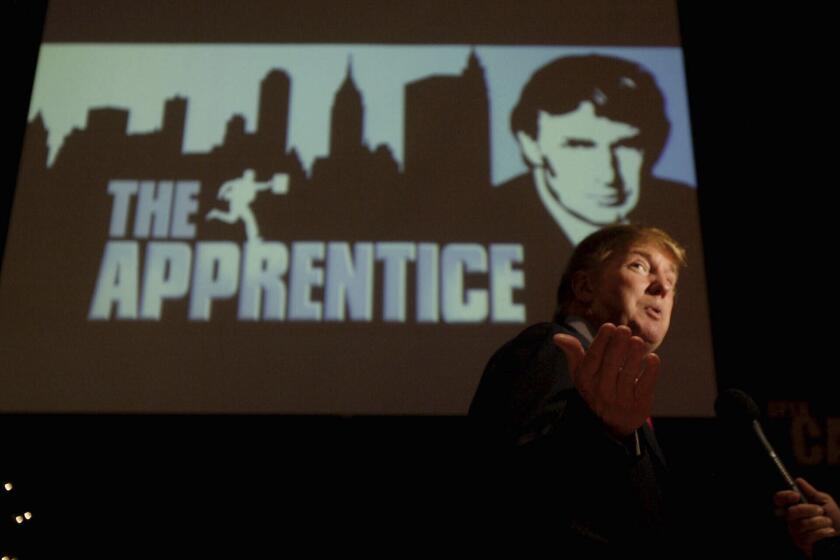Elie Wiesel, history’s witness

It was a fine April day last week that found Elie Wiesel at Chapman University; it was a fine April day too, 58 years earlier, when the gaunt, teenage Wiesel found himself alive and suddenly free to walk out of the Buchenwald concentration camp. In the decades since, Wiesel’s impassioned writing and speaking have won him a Nobel Peace Prize, and a large place in the public intellectual discourse about the Holocaust and the human condition. They have also brought him to Chapman each spring for the last three years as a distinguished presidential fellow, meeting with students and faculty to keep the significance of the Holocaust green in their minds.
FOR THE RECORD:
Liberation: Patt Morrison’s interview with Elie Wiesel on April 24 said the Buchenwald concentration camp was liberated 58 years ago. It was 68 years ago.
You’ve called for a commission of educators and philosophers in the wake of the Boston bombings. What would that accomplish?
We must understand what happened. Why did they do it? How come human beings decide to do something like that? They just threw the bombs, [at] no matter who. Is it political? Is it religious? Why go to a place where human beings come together just to be together, without any religious jealousy, without any economic problems, and disrupt that with bombs? We must know the reasons to make sure it won’t happen again.
Would knowing why have helped against the rise of Nazi Germany?
Oh, I don’t compare anything to Germany — that was such a horror-filled event. It could have been avoided had the world spoken up against Hitler in the late 1930s, warning Hitler not to go on. I don’t know any other way of fighting evil except denouncing it, its roots and its consequences.
You’ve helped put “Holocaust” into the world’s vocabulary, but has the word been hijacked? Should it be reserved for the Nazi exterminations?
I think yes. It has become trivialized. One day I heard a sportscaster on the radio [who] said for those who lost the game, it was a holocaust! The word became so trivialized, I don’t use it any more. I’m a teacher and a writer; my life is words. When I see the denigration of language, it hurts me, and it’s easy to denigrate a word by trivializing it.
What happens when all the survivors are gone, when the Holocaust is just one more awful thing in the history books?
Your question is a painful question about what will happen when the last survivor will be gone. I don’t want to be that one. The burden is so great, I don’t want that. But even when the last one will be gone, it will not be an opening for forgetting. Why? Because people who meet us, who listen to us, we make them into witnesses, and to listen to a witness is to become one. “I know because I saw him, I heard him, and I inherited certain images and certain words and certain experiences.”
In 2007, a Holocaust denier dragged you out of a hotel elevator, apparently hoping to force you to repudiate the truth of the Holocaust. What are the deniers’ motives?
It makes it easier for them to live without doubts, without questions. To me the deniers are morally deranged. And I would never engage them in a debate. I would never dignify them to have a debate with any one of them. To say there was no Holocaust, there was no Auschwitz — I wouldn’t dignify them.
You are a free-speech advocate, but you would like an exception carved out for deniers. Why?
They could [come into] any class I teach, any lecture I give, and say, “Professor Wiesel, how can you prove that?” I show them the number [tattooed on his arm]; they say, “What does that prove?’
There are exceptions in law. They should not be given, by the law, the privilege of free speech. This is given to people who believe in truth. But to use lies and falsehoods, not to think of what they are doing to the survivors. Therefore I would say no; that is why I would make that illegal. In certain countries in Europe, denying the Holocaust is a felony. But not here. I understand our tradition of free speech is so great, but I nevertheless plead for a kind of exception for this.
You have been outspoken on behalf of victims in genocide and civil war. You advocated intervention in Darfur. How do nations decide when to intervene?
The advice [for] any president or prime minister: Always listen to the victims. The perpetrator may have arguments, but the victim has more than that.
How do you read the Arab Spring?
I think it began well, a kind of spiritual and political rebellion. It was hijacked and turned into something else. Take Syria. The problem with Syria is painful because the Syrian border with Israel is the only one that has never been violated. The Syrians are respecting the border with Israel. And yet their fanatics are fanatics. What to do? If I knew the answer to that!
Why have you kept yourself apart from the discussions of the Israelis and Palestinians?
I speak; when asked, I will speak but not to create more controversy. I believe in the absolute fervor of Israel to have peace with the Palestinians; I am ready to swear on whatever is holy. I am confident that they will make peace, before many other countries make peace. My feeling is that it will happen soon, because it is enough. The Israeli population wants peace. A large majority are ready to give up territories for that. I am waiting for a miracle. I belong to a people that had miracles, that survived by miracles.
You lost your savings, and the Elie Wiesel Foundation for Humanity lost its $15 million, because of Bernie Madoff’s crimes. Has there been any restitution?
[The foundation is] beginning to get restitution. They won’t get the whole sum. Personally, we [he and his wife] lost everything. One Thursday night, we came home from dinner and the phone rang and we heard he was arrested.
What circle of hell would Dante consign Madoff to?
All!
Sometimes Mormons baptize non-Mormons, including Holocaust victims and survivors, even though the church has told its members not to. You’re laughing …
When someone said, “You are in the process of being converted,” I began laughing, and I said to myself, “It’s so absurd.” I stopped laughing [when] I said to myself, 100 years from now, some researcher, a student, will find something and say, “Hey, I didn’t know Elie Wiesel was a Mormon.” A researcher will say, “Look, the Jews were not killed by the Germans. Mormons were killed by the Germans.” To hurt our sensitivities — how can they do that?
You were born in Romania, lived in France and are a U.S. citizen.
First, I am an American. I lived in France as a stateless person. But I got citizenship here. The first thing I did, I got a passport. I never had a passport. I kept it in my pocket. And it’s always with me, in my pocket.
The plight of refugees occupies much of your work. How should the world treat political, economic, environmental refugees?
I also was a refugee. I came to America as a stateless person, therefore I am sentimentally close to the refugees. Whatever they are, wherever they are, I don’t know how, but I’m on their side. My obsession is the otherness of the other. We cannot humiliate the other by denying his or her otherness. The sin of humiliation — I came to America as a journalist, and in the South I saw the attitude toward blacks at the time. It was the law. The law of the land was to humiliate an entire race.
Buchenwald was liberated in April. On the anniversary, do you reflect on that deliverance?
Naturally. That day, we were supposed to leave the camp. Had we left, we would have been killed, like those who left the day before. We were already at the gate. There was an air alarm and the inmates had to go back to the block. And the American soldiers came.
You survived, but your father and your mother and sister died. So is it random ? Does God make these decisions?
If you believe in God, God makes these decisions. But we don’t know why. Why did he decide me, when others were worthier? To this day I don’t know.
Is that a burden?
I say to myself, since I did survive, my duty is to do something with my survival. I try. I’m not sure I’ve succeeded, but I try.
Follow Patt Morrison on Twitter @pattmlatimes
This interview was edited and excerpted from a taped transcript. An archive of Morrison’s interviews can be found at latimes.com/pattasks.
More to Read
A cure for the common opinion
Get thought-provoking perspectives with our weekly newsletter.
You may occasionally receive promotional content from the Los Angeles Times.











